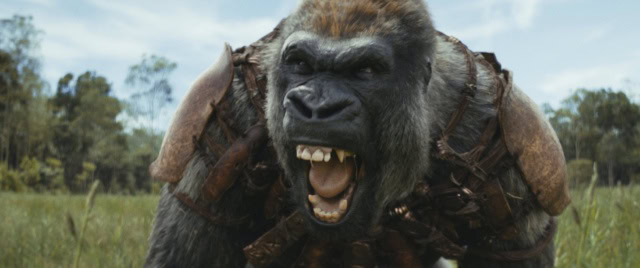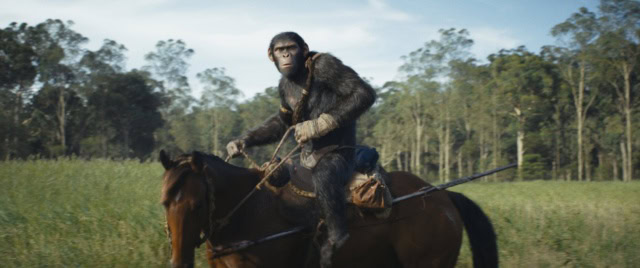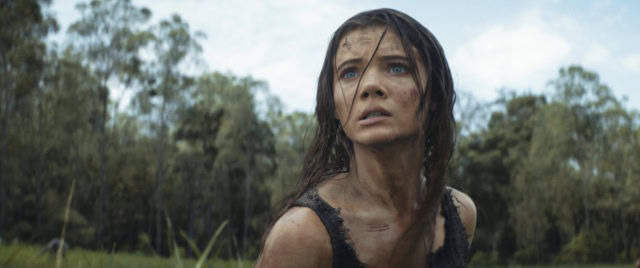Review: ‘Kingdom of the Planet of the Apes’

Kingdom of the Planet of the Apes is the tenth entry in the Planet of the Apes film franchise and the fourth entry in the reboot series, following the release of War for the Planet of the Apes in 2017. This summer sees Wes Ball (producer and director of the Maze Runner film adaptations) sitting in the director’s chair and Josh Friedman penning the screenplay (known for Terminator: The Sarah Connor Chronicles, TNT’s Snowpiercer, James Cameron’s Avatar film franchise, Matt Shakman’s The Fantastic Four).
[Editor’s Note: This review of Kingdom of the Planet of the Apes was written by John Daniel Tangalin]
The title for this new installment is an interesting one, succeeding the conception of a primate-centric population permeated throughout planet Earth, thus sparking an ongoing conflict between humanity and ape-kind. Kingdom of the Planet of the Apes, then, ends the genesis of the Caesar narrative and returns to its roots in science fiction (or teases it, anyway).
Ball directs such a fine story here. After Matt Reeves left the door open with Dawn of the Planet of the Apes and War for the Planet of the Apes, Kingdom has some big shoes to fill. Friedman’s screenplay paints an almost Biblical tale as its new protagonist, Noa (portrayed by Owen Teague), departs from his home and discovers a world unbeknownst to him. The narrative is not suited for all movie-goers, and it has become the subject of debate over whether Noa’s quest to protect his community, the Eagle Clan, is spiritual. On the one hand, it does appear so, although the narrative beats and pacing of the story present more of an out-of-body experience when Noa is illustrated as alone in the world.
The action sequences are a huge part of what makes this Planet of the Apes installment as radical as those that came before. Stunt coordinators Glenn Suter, Yasca Sinigaglia, and Marco Sinigaglia aid in scenes where Noa fights chief commander gorilla Sylva (portrayed by Eka Darville) and his bonobo monarch Proximus Caesar (portrayed by Kevin Durand).

Frankly, this pseudo-Caesar does not get much to do as an antagonist. He preaches false ideologies in scenes that he occupies and only exhibits his strength when surrounded by an audience. Suffice it to say that Sylva’s fight sequences with Noa offer way more intrigue as viewers get to see the two apes jump around closed spaces until one truly gains the upper hand. Visually, it is what is, but storyboard artists Sam Uther and Dan Milligan deserve all the credit for helping drive the plot forward.
The New New Testament for The Planet of the Apes
Kingdom of the Planet of the Apes can trudge in areas when Noa is surrounded by a group of other apes, and the gradual pace is primarily an outcome of his various interactions with family or members of the opposing society. Arguably, the middle act is when the character has more room to do as he pleases. Once he travels through a mysterious tunnel, it feels as if the franchise is transitioning into unexplored territory (literally and metaphorically), introducing new and exciting figures.
In his journey, Noa crosses paths with a Bornean orangutan named Raka (portrayed by Peter Macon) and encounters a near-quiet human named Nova (Freya Allan). The film’s concentration on this trio of characters is an incredible highlight of the dynamic between two living species, especially with one ape knowing profoundly much more about human beings’ past ways of living than the other.

Raka personifies wisdom as a bridge between Noa and Nova, and he uncannily showcases himself as a lovable character akin to Jedi Master Yoda in The Empire Strikes Back. In that manner, I feel like Kingdom of the Planet of the Apes serves as a neat liminal chapter for the reboots… and a special one at that.
As an action-adventure story, the film oftentimes looks unsure of where it is headed, and perhaps that’s a good thing. The narrative finds Noa navigating his way back to his community after a sudden separation from his clan left him on his own. On that note, Ball and Friedman’s Planet of the Apes story is a little too on-the-nose with its Biblical takes. The final act is a massive example of that, with the protagonist resolving to free a camp of slaves, not to mention Noa eventually at the presence of a large boat by uncertain waters.
An ages-old posthuman question in Kingdom of the Planet of the Apes
Conversely, there is something odd about the math viewers must do once Kingdom of the Planet of the Apes begins. The film occurs “generations later” in a world post-Caesar. On the surface, Earth has become a place where apes roam the lands with horses on their hinds and weapons in hand, while humans are almost back to the Stone Age. Under that surface is what is not explicitly conveyed to viewers. A few location settings in the back half of the film offer clues as to what the future of the reboots may involve, and honestly, this is the best part of all.
Take it as you will, but if there is one element to appreciate here, it is the storytellers’ application of the sciences. As is the case with the prior Planet of the Apes films, the usual conflict concerns the thesis of whether apes can co-exist with humans.
How characters respond to this dispute depends on the directors and screenwriters. In theory, Ball and Friedman accomplish an intelligent feat, to pose and emphasize a critique of posthumanism. Kingdom of the Planet of the Apes is a lot like the earlier Terminator films in that characters ask themselves if the ecosystem can be at a proper balance. James Cameron demonstrates the continuous fight for co-existence with advanced technology, whereas this franchise examines the struggle to live with more capable animals.
Science is key in Wes Ball and Josh Friedman’s film
As a reboot, Ball and Friedman’s film signals the arrival of what has not been seen in decades. Their beacon, then, has its roots in the sciences. Noa’s introduction to Raka takes place at an airport, pointing to aerodynamics. Once Nova joins their group, they soon find themselves at an observatory, alluding to astronomy. This is one of the more phenomenal moments of the film, associated with the theme of discovery.
The final act somehow deals with military science to an extent, but the objective isn’t wholly clear. Altogether, aerodynamics, astronomy, and military science are the ingredients for space travel, and to a certain degree, quantum physics. The ending of Kingdom of the Planet of the Apes will not be striking for everyone seeing it. However, loyal fans can piece together what else, or who else, could make an introduction to the new world.
Performances by Owen Teague & Freya Allen and development of Noa and Nova
Owen Teague performs the best out of his role as Noa, who is more curious than a monkey named George. The protagonist’s tendency to wound up in reckless predicaments can be awe-inspiring when necessary. At the same time, his character choices produce some rather predictable consequences, which makes him human-like at the end of it all. After having seen his thrilling role as Patrick Hockstetter in Andy Muschietti’s It: Chapter One and his dramatic part in the “Arkangel” episode of Black Mirror series 4, I can see why Teague was chosen for a role as cool as Noa.
I have an ambivalence when it comes to Freya Allan’s role as Nova. The franchise’s previous installment, War for the Planet of the Apes, includes a child-aged version of the character. There, she was made mute by the Simian Flu. However, in overthinking the math that explains the time jump between that film and this current one, viewers will understand that Allan’s Nova is not the same as the Nova in Reeves’ film.

In Kingdom of the Planet of the Apes, Nova is mute, too, but there is a reasoning behind it that unravels as the plot progresses. If fans are searching for the true “Nova”, then this might not be her. Yet, I do wonder if Allan will have a larger part in the next installments. Nova does have a fascinating scene that mirrors the original 1968 film (and this year’s prequel comic, Beware the Planet of the Apes).
Final thoughts on Kingdom of the Planet of the Apes
Kingdom of the Planet of the Apes is not a perfect entry, by any means. One viewer’s interpretation of the pacing may be different from another’s, but what matters most are the key details related to Friedman’s script. The callbacks to previous series installments, such as the uniquely shaped window tied to Caesar’s domestic upbringing, are nice Easter Eggs to spot.
Kingdom is a compelling prefix for this film’s title. Literally, the plot regards an antagonist who self-anoints himself as a ruler and his little empire who treats his words as powerful. On a deeper level, Kingdom looks at the living species of both apes and human beings as falling under animalia, or animals. Given what Friedman contributed to this film, I’m now more curious as to what he will do with next year’s The Fantastic Four.
Kingdom of the Planet of the Apes is now playing in theaters! Have you seen it yet? Let us know what you think on social media @mycosmiccircus or in The Cosmic Circus Discord.
Also check out: Furiosa is Ambitious, Admirable, but it’s No Fury Road


